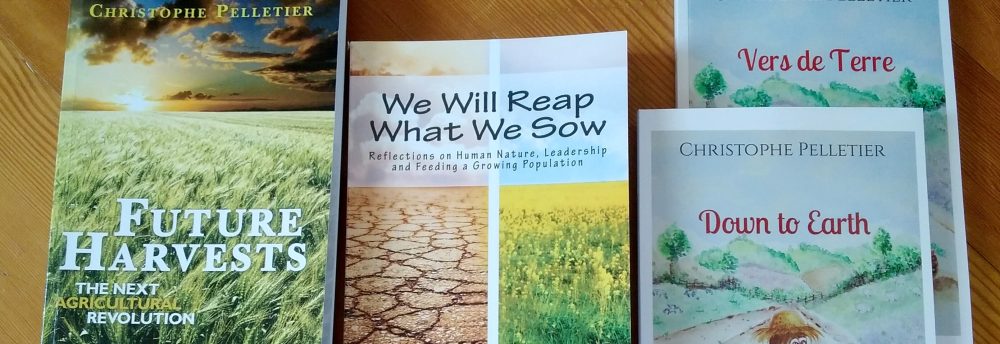Little note March 18 2020: I am busy writing a book of poems about the theme of food and agriculture. The poetry book has now been published both in English as “Down to Earth” and in French as “Vers de Terre“. It is available both as paperback and Kindle.
The more discussions about future food production and food security in which I participate, the more I discover the amazing number of dimensions this issue contains. This makes it even more fascinating to investigate and to reflect upon it.
Meeting the food demand of an increasing world population goes much further than agriculture. Some like to see it as a matter of science and technology, others as a social issue, others as an economic problem and so on. This is all true, but isolating the various pieces of the puzzle is not satisfactory. At least, it is not to me. When I listen to the many points of views, it becomes increasingly obvious to me that we will need to integrate all these dimensions: the science, the technology, the finance, the social, the environmental, the cultural, the religious, the spiritual, the philosophical and the moral. I probably even forget to mention some dimensions in this list.
As human beings, we have the privilege of the thinking and of setting the rules to ensure our prosperity. The human genius is amazing, and we have been able to develop an astonishing amount of tools to improve our lives. However, tools are only an extension of our understanding and of our perception of the world around us.
The drivers of our societies have changed in the course of time. In ancient Greece, philosophy and science played a central role in our effort to understand the world. During the Middle Ages, science became a threat to religious leaders. Galileo experienced the pressure. Science did not make much progress in these dark centuries. With the Renaissance, the arts and the curiosity to understand the world came back in fashion, supported by a number of enlightened rulers. Leonardo da Vinci could experiment and let his genial mind at work without fear. For a couple of centuries, science, arts and philosophy were considered equally important. Personally I am a great admirer of the 18th century philosophers/scientists whose curiosity helped develop many theories and research that are still useful today. During the course of the 20th century, a shift occurred. Science gradually took a dominant position, and the philosophical, the spiritual and the arts lost quite a bit of their lustre. I can understand that the feeling of “exactness” in science offers an apparent sense of security, although, the use we make of science is not always that exact. Some of our societies seem to reject anything that has not been proven scientifically. They tend to reject the point of views of those who search answers in other areas of human sciences. Pragmatism, which I strongly advocate, requires that we consider all possibilities, before choosing which ones offer the best answers to our problems. Science is not a judge for what should be allowed or not. For eons, farmers have applied successful techniques without having any scientific explanations, simply because science was not advanced enough. That does not take away that certain things worked. Similarly, we need to keep an open mind about yet scientifically unproven techniques. If we had to know how everything works before we could do anything, we would be stuck in inaction. I believe that technical sciences and human sciences have much to benefit from each other. Only by considering all aspects of our knowledge, technical as well as human, will we be able to achieve the most in future years.
Recently, I remembered a poem I had to learn in school. Although the topic has some agricultural background, the theme is more about the true values in life and the true riches. It is about fulfillment and achievement, but it also gives a nice reference to what motivates most of us. I believe it could serve as a useful tool to think about what will or should really matter for the future.
Here I give you Jean de la Fontaine’s “Le Laboureur et ses Enfants” that he published in 1668, first in French, and then translated in English.
French version:
Le laboureur et ses enfants
Travaillez, prenez de la peine :
C’est le fonds qui manque le moins.
Un riche Laboureur, sentant sa mort prochaine,
Fit venir ses enfants, leur parla sans témoins.
Gardez-vous, leur dit-il, de vendre l’héritage
Que nous ont laissé nos parents.
Un trésor est caché dedans.
Je ne sais pas l’endroit ; mais un peu de courage
Vous le fera trouver, vous en viendrez à bout.
Remuez votre champ dès qu’on aura fait l’Oût.
Creusez, fouiller, bêchez ; ne laissez nulle place
Où la main ne passe et repasse.
Le père mort, les fils vous retournent le champ
Deçà, delà, partout ; si bien qu’au bout de l’an
Il en rapporta davantage.
D’argent, point de caché. Mais le père fut sage
De leur montrer avant sa mort
Que le travail est un trésor.
English translation:
The farmer and his children
Work hard, sweat all you can:
Riches is what counts the least.
A rich farmer, sensing his impending death,
Called for his children, and spoke to them without witnesses.
Do not sell the inheritance left by our parents, he said,
As a treasure is hidden in it.
I do not know where, but with a bit of courage
You will find it, you will figure it out.
Go search the field when summer ends.
Dig, scratch, plow, do not leave no earth unturned
Anywhere your hands can reach.
After the father’s death, the sons worked the field
Everywhere, over and over again, so that within a year
It produced more than ever before.
There was no money to be found, but the father had been wise
To show them before his death
That work is a treasure.


